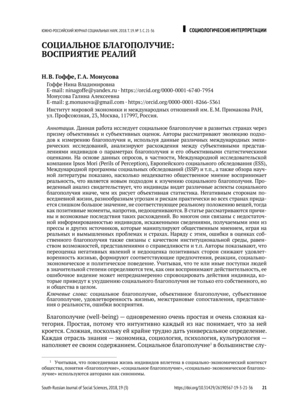Аннотация
Данная работа исследует социальное благополучие в развитых странах через призму объективных и субъективных оценок. Авторы рассматривают эволюцию подходов к измерению благополучия и, используя данные различных международных эмпирических исследований, анализируют расхождения между субъективными представлениями индивидов о параметрах благополучия и его объективными статистическими оценками. На основе данных опросов, в частности, Международной исследовательской компании Ipsos Mori (Perils of Perception), Европейского социального обследования (ESS), Международной программы социальных обследований (ISSP) и т. п., а также обзора научной литературы показано, насколько неадекватно общественное мнение воспринимает реальность, что является новым подходом к изучению социального благополучия. Проведенный анализ свидетельствует, что индивиды видят различные аспекты социального благополучия иначе, чем их рисует объективная статистика. Негативным сторонам повседневной жизни, разнообразным угрозам и рискам практически во всех странах придается слишком большое значение, не соответствующее реальному положению вещей, тогда как позитивные моменты, напротив, недооцениваются. В статье рассматриваются причины и возможные последствия таких расхождений. Во многом они связаны с недостаточной информированностью индивидов, искаженными сведениями, получаемыми ими из прессы и других источников, которые манипулируют общественным мнением, играя на реальных и вымышленных проблемах и страхах. Наряду с этим, ошибки в оценках собственного благополучия также связаны с качеством институциональной среды, равенством возможностей, представлениями о справедливости и т. п. Авторы показывают, что переоценка негативных явлений и недооценка позитивных сторон снижают удовлетворенность жизнью, формируют соответствующие предпочтения, реакции, социально-
экономическое и политическое поведение. Учитывая, что те или иные поступки людей в значительной степени определяются тем, как они воспринимают действительность, ее ошибочное видение может непреднамеренно спровоцировать действия индивида, которые приведут к ухудшению социального благополучия не только его собственного, но и общества в целом.
Ключевые слова
Библиографические ссылки
Донцов, А.И., Перелыгина, Е.Б., Ригель, А.М. (2016, Cентябрь/Октябрь). Объективное и субъективное благополучие: два подхода к исследуемой теме. Вопросы психологии, 5, 3–14.
Кислицына, О.А. (2016) Измерение качества жизни / благополучия: международный опыт. Москва: Институт Экономики РАН.
Хащенко, В.А. (2011, Январь/Март). Субъективное экономическое благополучие и его измерение: построение опросника и его валидизация. Экспериментальная психология, 4 (1), 106–127.
Alesina, A., Stantcheva, S., & Teso, E. (2017, January). Intergenerational mobility and support for redistribution. NBER. WP No. 23027. Cambridge (Mass.).
Beutin, B., Canoy, M., Horvath, A., Hubert, A., Lerais, F., & Sochacki M. (2007, January). Reassessing the Link between Public Perception and Migration Policy. European Journal of Migration and Law, 9 (4), pp. 389–418.
Boarini, R., Johansson, A., & d`Ercole, M.M. (2006, February). Alternative measures of well-being. Social, Employment and Migration Working Papers, 33. Paris: OECD.
Caplan, B. (2007). The Myth of the Rational Voter: Why Democracies Choose Bad Policies. Princeton: Princeton University Press.
Diener, E., Suh, E.M., Lucas, R.E., & Smith, H.L. (1999, March). Subjective well-being: three decades of progress. Psychological Bulletin, 125 (2), pp. 276–302.
Duncan, P., & Kommenda, N. (2017, December 6). Do you know the state of your country? Take the test, as poll reveals perception gap. The Guardian. Retrieved from https://www.theguardian.com/politics/datablog/2017/dec/06/perception-reality-gap-global-poll-overestimate-bad-stuff-murder-rate-prisoners-pregnancies#img‑1
Easterlin, R.A. (1974). Does economic growth improve the human lot? Some empirical evidence. New York: Academic Press.
Gimpelson, V., & Triesman, D. (2015, May). Misperceiving Inequality. NBER. WP no. 21174. Cambridge (Mass.).
Hamermesh, D.S. (2004, July). Subjective outcomes in economics. Southern Economic Journal, 71 (1), pp. 2–11.
Hodge, R., & Treiman, D. (1968, October). Social participation and social status. American Sociological Review, 33 (5), pp.722–740.
Inglehart, R.F. (2018). Cultural evolution. People`s motivation are changing, and reshaping the world. Cambridge (UK): Cambridge University Press.
Ipsos Mori. Retrieved from https://www.ipsos.com/ipsos-mori/en-uk/about-us
Jackman, M., & Jackman, R. (1973, October). An interpretation of the relation between objective and subjective social status. American Sociological Review, 38 (5), pp.569–582.
Kahneman, D. (2011). Thinking, Fast and Slow. New York: Farrar, Straus and Giroux.
Kahneman, D., Diener, E., & Schwarz, N. (Eds.). (1999). Well-being: the foundations of hedonic psychology. New York: Russell Sage Found.
Kahneman, D., & Tversky, A. (1979, March). Prospect theory: an analysis of decision under risk. Econometrica, 47 (2), pp. 263–292.
Layard, R. (2011). Happiness: Lessons from new Science. London: Penguin Group.
OECD. Measuring Well-being and Progress: Well-being Research. Retrieved from http://www.oecd.org/statistics/measuring-well-being-and-progress.htm
Ortiz-Ospina, E., & Roser, M. (2018). Happiness and Life Satisfaction. Retrieved from https://ourworldindata.org/happiness-and-life-satisfaction
Perils of Perception 2014, 2016. Retrieved from http://perils.ipsos.com/archive/index.html
Perils of Perception 2017. Retrieved from http://perils.ipsos.com
Pine II, B.J., & Gilmore, J.H. (2011). The experience economy. Boston: Harvard Business School Publishing.
Proto, E., & Rustichini A. (2014, January). GDP and life satisfaction: new evidence. Retrieved from https://voxeu.org/article/gdp-and-life-satisfaction-new-evidence
Public Opinions and Immigration: Individual Attitudes, Interest Groups and the Media. (2010). International Migration Outlook, part III. pp. 115–156. Retrieved from http://www.oecd.org/els/mig/48328734.pdf
Schulze, G. (2000). Die Erlebnisgesellschaft. Kultursoziologie der Gegenwart. Frankfurt / New York: Campus Verlag.
Stigliz, J.E., Sen, A., & Fitoussi, J.P. (2010). Mis-measuring our lives. Why JDP doesn`t add up. New York: The New Press.
Stutzer, A., & Frey, B.S. (2012, December). Recent developments in the economics of happiness: a selective overview. DP No. 7078, Bonn: IZA.
The European social survey. Retrieved from www. europeansocialsurvey. org
The Future of GDP. (2018, May). Zurich: Credit Suisse Research Institute.
Understanding society. (2015). Ipsos MORI. Retrieved from https://www.ipsos.com/ipsos-mori/en-uk/understanding-society-perils-perception
Van Praag B. (2011, March) Well-being inequality and reference groups: an agenda for new research. Journal Economic Inequality, 9, 111–127.
Witters, D., & Liu, D. (2017, May). Income buys happiness differently based on where you live. GALLUP. Retrieved from https://news.gallup.com/opinion/gallup/210011/income-buys-happiness-differently-based-live.aspx
World Economic Forum. (2017, January). The inclusive growth and development report 2017. Geneva: World Economic Forum.


